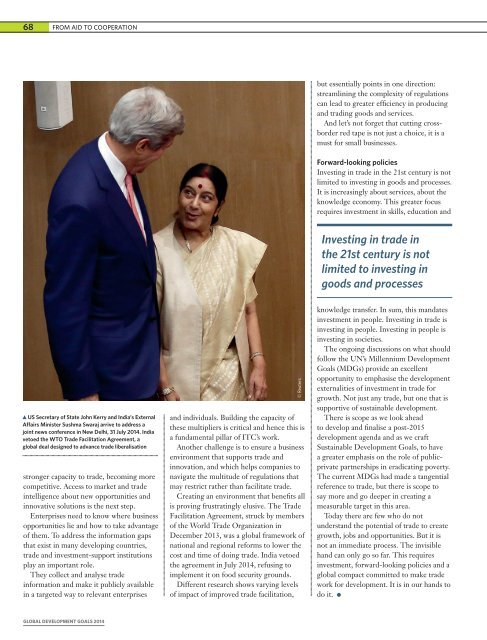FAMBB
FAMBB
FAMBB
You also want an ePaper? Increase the reach of your titles
YUMPU automatically turns print PDFs into web optimized ePapers that Google loves.
68 FROM AID TO COOPERATIONbut essentially points in one direction:streamlining the complexity of regulationscan lead to greater efficiency in producingand trading goods and services.And let’s not forget that cutting crossborderred tape is not just a choice, it is amust for small businesses.Forward-looking policiesInvesting in trade in the 21st century is notlimited to investing in goods and processes.It is increasingly about services, about theknowledge economy. This greater focusrequires investment in skills, education andInvesting in trade inthe 21st century is notlimited to investing ingoods and processesUS Secretary of State John Kerry and India’s ExternalAffairs Minister Sushma Swaraj arrive to address ajoint news conference in New Delhi, 31 July 2014. Indiavetoed the WTO Trade Facilitation Agreement, aglobal deal designed to advance trade liberalisationstronger capacity to trade, becoming morecompetitive. Access to market and tradeintelligence about new opportunities andinnovative solutions is the next step.Enterprises need to know where businessopportunities lie and how to take advantageof them. To address the information gapsthat exist in many developing countries,trade and investment-support institutionsplay an important role.They collect and analyse tradeinformation and make it publicly availablein a targeted way to relevant enterprisesand individuals. Building the capacity ofthese multipliers is critical and hence this isa fundamental pillar of ITC’s work.Another challenge is to ensure a businessenvironment that supports trade andinnovation, and which helps companies tonavigate the multitude of regulations thatmay restrict rather than facilitate trade.Creating an environment that benefits allis proving frustratingly elusive. The TradeFacilitation Agreement, struck by membersof the World Trade Organization inDecember 2013, was a global framework ofnational and regional reforms to lower thecost and time of doing trade. India vetoedthe agreement in July 2014, refusing toimplement it on food security grounds.Different research shows varying levelsof impact of improved trade facilitation,© Reutersknowledge transfer. In sum, this mandatesinvestment in people. Investing in trade isinvesting in people. Investing in people isinvesting in societies.The ongoing discussions on what shouldfollow the UN’s Millennium DevelopmentGoals (MDGs) provide an excellentopportunity to emphasise the developmentexternalities of investment in trade forgrowth. Not just any trade, but one that issupportive of sustainable development.There is scope as we look aheadto develop and finalise a post-2015development agenda and as we craftSustainable Development Goals, to havea greater emphasis on the role of publicprivatepartnerships in eradicating poverty.The current MDGs had made a tangentialreference to trade, but there is scope tosay more and go deeper in creating ameasurable target in this area.Today there are few who do notunderstand the potential of trade to creategrowth, jobs and opportunities. But it isnot an immediate process. The invisiblehand can only go so far. This requiresinvestment, forward-looking policies and aglobal compact committed to make tradework for development. It is in our hands todo it.GLOBAL DEVELOPMENT GOALS 2014


